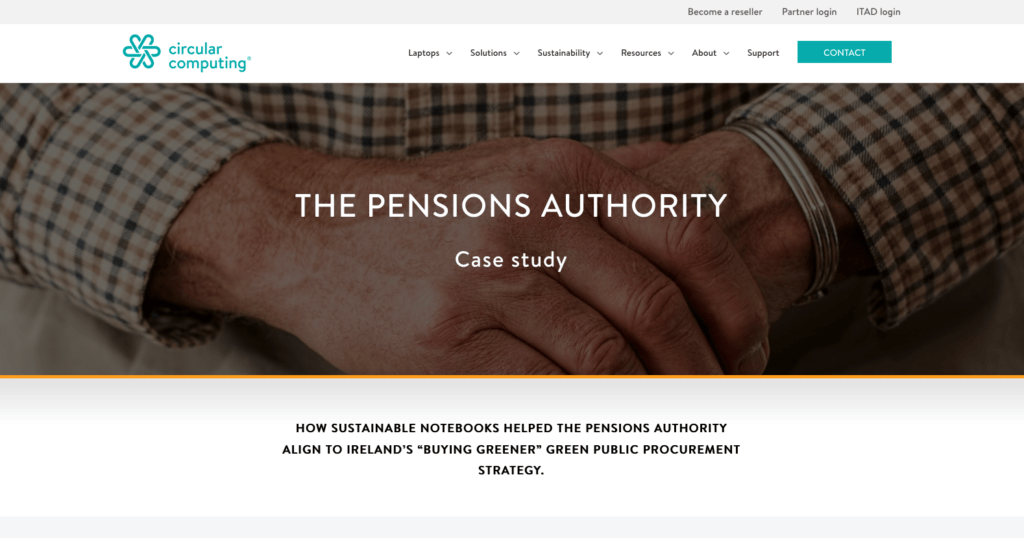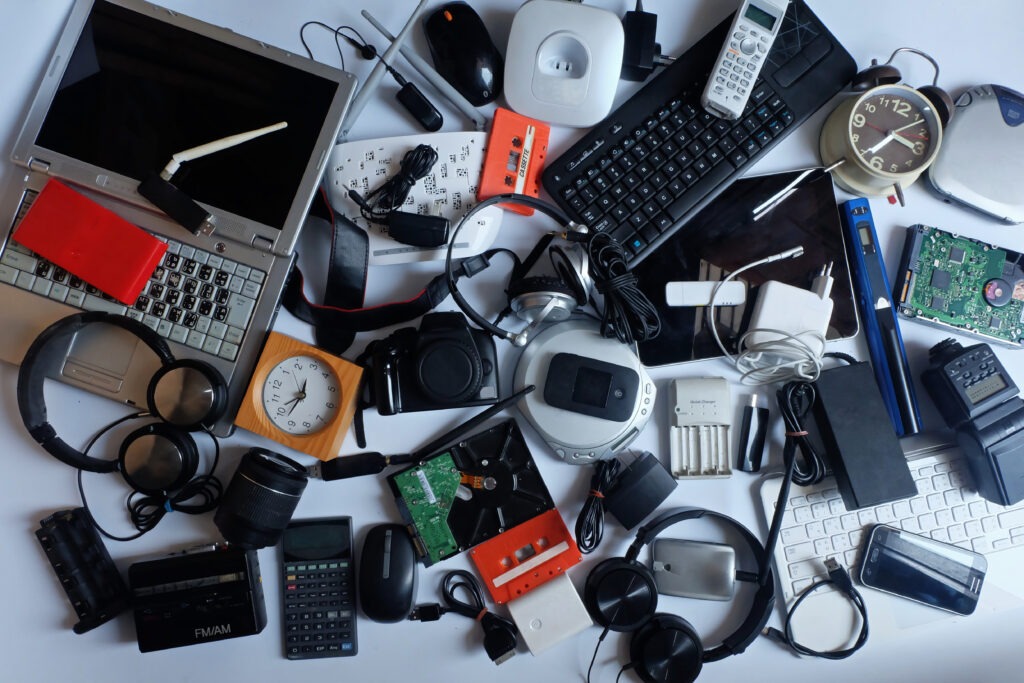Current EPA funded Research Project
MainCirc: Mainstreaming Circular Economies Through Collaboration & Co-creation
The overall project objective is to support the mainstreaming of circular business models in Ireland. The research team consisting of a multi-disciplinary group of academics and an industrial partner will co-create circular business models (CBMs) that will accelerate the circularity in Ireland, these models will be developed and tested within the ICT sector, to quantify impacts and deliver policy and transferrable knowledge.

This demonstration project is co-created and collaborative in nature, bringing together a multi-disciplinary team and industry partner to tackle a priority value chain, enhance circularity, and support entrepreneurship through market insight. Beyond this, the project will explore the impact of new CBMs on supporting SDG goals 12 and 8, on meeting WEEE targets, and on identifying mission critical competencies for sustainable competitive advantage within the seven key value chains as identified in the Circular Economy Action Plan and developing them within the specific partner network.
The success of circular business models is predicated on market acceptance and growth. However, the majority of existing business models are linear in orientation, acquire and use critical raw materials, termed operand resources, assume that value is embedded in products and services and focus on market development and growth as a source of profitability (‘goods-dominant logic). Market actors have been socialised into associating value with newness in many business categories to the extent that customers expect and accept increasingly truncated product lifecycles in most product categories from fashion to phones, laptops to TVs. Consequently, the very notion of built-in obsolescence is central to traditional business models where profits are made through managing a pipeline of product innovations. Even firms engaged with the green economy focus on repair, reuse, and refurbishment of the core product. We need to understand whether this curbs market growth in any meaningful way, explore the precise impact such activities have on circularity, and ultimately determine whether new business models are required to better inform, shape and mainstream circularity in the Irish economy.
The learnings from this project will be developed and shared with other business sectors in order to advance the ultimate goal of mainstreaming circularity in ways that are accessible, effective and sustainable. “Goods dominant logic” has been criticised as an outdated mode of thinking and one which is limited in accommodating the connected and creative thinking required to support circularity as a business model. Essentially, businesses need to reframe how value is understood, experienced, and co-created by market actors in order to pursue new sources of profit and growth. Several contemporary discussions acknowledge the significance of ‘service’ within new business models (Vargo and Lusch, 2004), expressed in the move toward servitization (Smith et al., 2014), collaboration and value co-creation. Here, service is understood as the application of critical skills and competences (operant resources) to co-create value with customers and other partners, where value is agreed by the beneficiaries and can include conventional measures, such as meeting business goals (revenue, access to resources, monetising existing skills), but also captures measures for circular economy, including environmental impact and sustainability metrics, as well as more idiosyncratic measures as emerge in the context of a specific collaboration. This is reflected in the use of outcomes rather than inputs as criteria for evaluation (see Ng et al., 2009; Zolkiewski et al, 2017). Value co-creation offers far greater opportunities for growth given its emphasis on the application and use of operant resources (competences and skills) rather than focusing on operand resources (raw materials and physical goods), which have a greater environmental impact. A shift towards service and value co-creation may be central for the mainstreaming of circularity as it opens up opportunities for collaboration, foregrounds the centrality of developing operant resources in re-using, re-imagining and re-valuing operand resources. This project will examine and determine the opportunities for mainstreaming circular economies in Ireland.
In order to develop an exemplar case for this demonstration project, we have chosen an industry sector that is highly impactful in terms of generating waste and contributing to environmental degradation, where the market is deeply embedded within a goods dominant logic and therefore offers significant potential for circularity (high product obsolesce, truncated product lifecycles, emphasis on product innovation and new products). We therefore focus on the design and implementation of circular business models in the electronics/ICT sector in conjunction with our project partner Green IT, an Irish owned SME specialising in the refurbishment, repurposing and repair of used ICT. The research team held a series of workshops focussing on entrepreneurship, environmental and marketing aspects of Green IT’s current business practices and from these workshops several key insights emerged. They currently resell refurbished ICT and our case study will detail their current approach and consider its impact on circularity and their business model. Through action research we will explore new market segments, examine customer attitudes towards new and refurbished products, determine market readiness and explore opportunities for value co-creation. Market research will establish the extent to which the Irish market is prepared for circularity, the potential market size. Focusing on customer experiences, it will consider cognitive, affective, emotional, social and physical experiences and outcomes associated with of buying and using re-furbished equipment in order to understand the current buying proposition, explore levels of resistance and develop appropriate marketing strategies that remove actual and perceived barriers. A number of high-potential customers/partners will be identified, and through mediated workshops which explore the interplay of firm and customer operant resources, opportunities for circular value co-creation will be developed and supported. Through action research competencies for mainstreaming circularity will be developed within the targeted business network, a process which will be documented and ultimately used as the basis for wider dissemination.
Members of the project team have collaborated successfully to address many of the societal and public engagement issues relating to problematic waste electrical and electronic equipment (WEEE). The EEE2WEEE project examined why consumers hoard ICT WEEE, CollectWEEE and TriREUSE examined ways to mobilize WEEE through secure collection and quality assurances. Two of the research team are involved in EU Projects (Wasteforce & STRiKE) relating to the illegal trade of problematic waste, including WEEE through Europe, the Balkans and Africa. Knowledge gained from this research contributes to increasing the case for cycling as much ICT as possible within the EU.
This research is being funded by the Environmental Protection Agency (EPA) under the EPA Research Programme 2021−2030. The EPA Research Programme is a Government of Ireland initiative funded by the Department of the Environment, Climate and Communications. More information about the EPA Research Programme can be found by visiting the EPA website.
We started with a small order to test the waters, but once we saw the quality and service Green IT provided, it became a no-brainer. The devices look and perform like new, the customer service is excellent, and the procurement process is much smoother than with traditional suppliers. We’ve now fully switched to remanufactured laptops, placing a large order of 60 devices, and we have no plans to go back. Green IT gives us better value, reliable equipment, and a more sustainable way to meet our IT needs.
Jason Browne from KARE jason.browne@kare.ie
Related Blog Posts
Trisk Research Team at University of Limerick Collaborates with Green IT
Trisk Research Team at University of Limerick Collaborates with Green IT in Transformative Government Contract for Sustainable…
Exploring Sustainability and the Circular Economy: The Work of Dr. Yvonne Ryan and the TRISK Research Group
Dr. Yvonne Ryan, a prominent figure in the realm of sustainability, waste management, and the circular economy,…
Exploring the Intersection of Marketing, Sustainability, and Authenticity: An Interview with Professor Lisa O’Malley
In the realm of academia, few voices resonate as profoundly as that of Professor Lisa O’Malley, an…
Unraveling Circular Solutions: A Conversation with Professor Michelle O’Dwyer
In the vibrant landscape of academia, Professor Michelle O’Dwyer stands as a luminary in Entrepreneurship at the…




